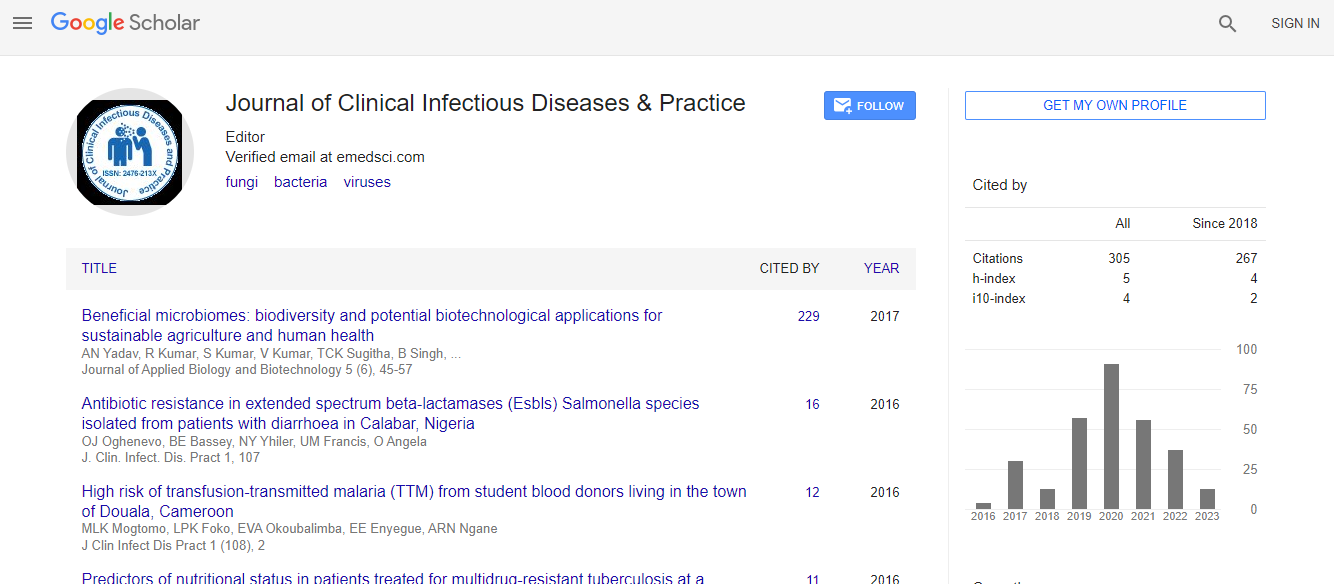Our Group organises 3000+ Global Conferenceseries Events every year across USA, Europe & Asia with support from 1000 more scientific Societies and Publishes 700+ Open Access Journals which contains over 50000 eminent personalities, reputed scientists as editorial board members.
Open Access Journals gaining more Readers and Citations
700 Journals and 15,000,000 Readers Each Journal is getting 25,000+ Readers
Google Scholar citation report
Citations : 531
Journal of Clinical Infectious Diseases & Practice peer review process verified at publons
Indexed In
- Google Scholar
- RefSeek
- Hamdard University
- EBSCO A-Z
- Publons
- ICMJE
Useful Links
Share This Page
The final battle: Wisdom of the crowd against medical mysteries
9th World Congress on Rare Diseases and Orphan Drugs
Shmuel Prints
NDC Medicine, Israel
ScientificTracks Abstracts: J Clin Infect Dis Pract
Abstract
An extraordinary diagnostic delay is a key problem in the rare diseases field. According to public health studies, the greatest loss of time occurs in primary and secondary outpatient care. The inability of most physicians to recognize rare diseases in their daily practice is commonly explained by a low suspicion. This notion misses a main culprit in the clinical diagnostic workup that prevails in modern medicine the classification algorithm. It perfectly recognizes frequent diseases, and at the same time inevitably neglects rare ones. From this point of view, crowdsourcing a diagnosis for mysterious patients’ cases has an undoubted methodological advantage. By simultaneously introducing a patient with an unusual combination of symptoms to a wide range of doctors, we increase the likelihood that among them there is someone who has seen a similar clinical picture before. Educational medical websites, that present already-solved rare cases as a riddle for training doctors, shows that the correct diagnosis arises among some physicians in a short matter of time. Recent researches proved that it takes the same accuracy to solve patients with an unclear diagnosis in medical forums and other discussion platforms for doctors. Our web-based platform, NDC Medicine, offers a unique solution for fast and accurate diagnosis of medical mysteries by harnessing the power or crowdsourcing and AI. It solves three main problems of current crowd sourcing platforms for undiagnosed patients: a) Quality case presentation. b) Gathering all possible diagnoses. c) Shortlisting the best ones using Artificial Intelligence. Ending the diagnostic odyssey for millions of patients worldwide has never been so close.Recent Publications
1. Michael L Barnett, Dhruv Boddupalli, Shantanu Nundy, et al., (2019) Comparative accuracy of diagnosis by collective intelligence of multiple physicians vs. individual physicians. JAMA Netw Open. 2(3):e190096.
2. Nick Black, Fred Martineau and Tommaso Manacorda (2015) Diagnostic odyssey for rare diseases: exploration of potential indicators. Policy Innovation Research Unit in Department of Health Services Research & Policy, London School of Hygiene & Tropical Medicine.
3. C Heneghan, P Glasziou, M Thompson, et al., (2009) Diagnostic strategies used in primary care. BMJ. 338:b946.
4. Ashley N D Meyer, Christopher A Longhurst and Hardeep Singh (2016) Crowdsourcing diagnosis for patients with undiagnosed illnesses: an evaluation of crowdmed. J Med Internet Res. 18(1):e12.
Biography
Shmuel Prints is an Internal Medicine and Public Health Specialist with over 30 years of experience in Russia and Israel. His greatest passion is diagnosing rare diseases and medical mysteries. Five years ago, he has realized that the diagnostic delay of rare diseases has a systematic reason and offered a web-based discussion as a solution. Since then, he developed the idea into a practical tool and founded NDC Medicine, a digital-health startup for diagnosing medical mysteries, now in the proof of concept stage.
E-mail: andyc4pr@gmail.com

 Spanish
Spanish  Chinese
Chinese  Russian
Russian  German
German  French
French  Japanese
Japanese  Portuguese
Portuguese  Hindi
Hindi 
